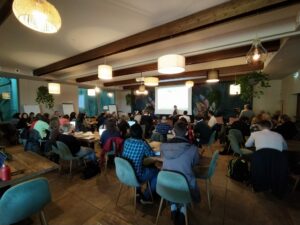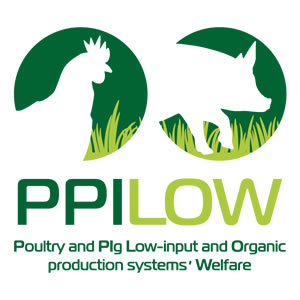Great success for the PPILOW autumn school!
– by Marlène Sciarretta (EAAP), Cesare Catellini e Simona Mattioli (UNIPG)
 The PPILOW autumn school three-day event recently took place from 25th to 27th October in Assisi, Italy, organised by EAAP and University of Perugia. The primary aim of the event was to introduce researchers, veterinarians, technicians, farmers, university and post-doc students to the PPILOW project and give them an overview of the most recent results obtained, and the novel techniques being used inside the project. Forty-five participants from Italy, Spain, Romania, Belgium, Netherlands, Finland, UK, Switzerland and Ireland attended the event. They had different backgrounds and a keen interest in welfare and animal breeding. The event provided an excellent platform for the participants to interact with each other and share their knowledge and experiences.
The PPILOW autumn school three-day event recently took place from 25th to 27th October in Assisi, Italy, organised by EAAP and University of Perugia. The primary aim of the event was to introduce researchers, veterinarians, technicians, farmers, university and post-doc students to the PPILOW project and give them an overview of the most recent results obtained, and the novel techniques being used inside the project. Forty-five participants from Italy, Spain, Romania, Belgium, Netherlands, Finland, UK, Switzerland and Ireland attended the event. They had different backgrounds and a keen interest in welfare and animal breeding. The event provided an excellent platform for the participants to interact with each other and share their knowledge and experiences.
The training school was divided into two different sessions that focused on the various activities of the PPILOW project. The sessions were led by experts in the field who are directly involved in specific activities of the project. The topics included animal welfare and ethical issues, and the adaptability to outdoor rearing systems. At the end of each session, the participants animated practical team work sessions with the aim to analyse the viewpoint of the chain actors (Producers and breeders, Civil Society, Technical Experts, Supply chain, Academic/R & D experts) of poultry production, addressing topics as: the choice of poultry genotypes, housing system, management practices, diets, product quality, environmental impact, and action to overcome the main problems.
 On the last day, the students visited the Azienda Agricola San Bartolomeo, located in Viterbo, a unique reality in central Italy, where for years they used a free-range poultry rearing, in a huge agroforestry system (about 300 ha of consociation of olive trees and poultry). Overall, the PPILOW autumn school was a success, and the participants found it an enriching and rewarding experience with a deeper understanding of the PPILOW project. There were many exchanges of experiences around the low-input outdoor and organic systems for pig and poultry, and discussions on how to improve their welfare. Moreover, the event provided attendees with a unique opportunity to interact with international experts in the field.
On the last day, the students visited the Azienda Agricola San Bartolomeo, located in Viterbo, a unique reality in central Italy, where for years they used a free-range poultry rearing, in a huge agroforestry system (about 300 ha of consociation of olive trees and poultry). Overall, the PPILOW autumn school was a success, and the participants found it an enriching and rewarding experience with a deeper understanding of the PPILOW project. There were many exchanges of experiences around the low-input outdoor and organic systems for pig and poultry, and discussions on how to improve their welfare. Moreover, the event provided attendees with a unique opportunity to interact with international experts in the field.


